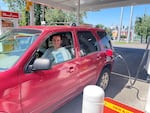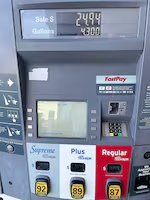Alex Fox was sitting at a Shell station just off I-5 in Portland on Friday as an attendant filled up his SUV.
He’s an Oregonian, so he understands the long-standing tradition of granting the gas pump a wide berth. But he welcomes self-service gas.
“I like the idea of being able to do it myself,” he said. “Because there’s been times where I’ve had to wait for a few minutes, which is fine. But, if I’m in a rush it would be nice to just do it myself.”
And despite growing up primarily in one of the country’s two states that have historically required gas station attendants to fill motorists’ tanks, Fox feels reasonably well prepared to take on the task.

Oregonian Alex Fox sits in his car at a Portland gas station in June. He just learned to pump his own gas - at 28. “I was a little bit anxious. I actually had to ask someone next to me if they knew how to do it. But once they explained it, it was pretty easy.”
Kristian Foden-Vencil / OPB
“I actually just learned how to pump gas and I’m 28,” he said. “I was a little bit anxious. I actually had to ask someone next to me if they knew how to do it. But once they explained it, it was pretty easy.”
For the last 72 years, most Oregonians have been largely banned from pumping their own gas. Back in 1951, legislators worried about fire safety and maintaining gas station attendant jobs.
But Oregon lawmakers voted to enter the self-service era last week and Gov. Tina Kotek is expected to sign the bill.
The National Fire Protection Association estimates there are more than 4,000 fires at U.S. gas stations every year, causing an average of three deaths, 43 injuries and $30 million worth of damage.
So safety is a genuine concern.
But close to half of those fires don’t involve vehicles — they’re electrical shorts in the building or dumpster fires. And for fires that start at the pump, the data doesn’t differentiate between mechanical failure and human error.
So it’s unclear how many fires are caused by the misuse of gas pumps.

Gas prices were $5.39 for regular at this Vancouver gas pump on June 23, 2023. A new bill passed by the Oregon state legislature will require stations in Oregon’s most populous counties to employ an attendant and offer full-service fueling -- all with no difference in price.
Kristian Foden-Vencil / OPB
Management consultant Stephan Thompson was at the same Portland Shell station as Fox on Friday. He appreciates having someone else pump his gas and says it’s a shame some people are going to lose their job.
“There’s a lot of people in the state that need the work,” he said. “I don’t know that it really necessarily has cost anyone much, because the gas stations are still all pumping and making money. So I’m not quite sure what the motivation is behind it.”
The bill won’t put all of Oregon’s gas station attendants out of work. Stations in Oregon’s most populous counties still have to employ an attendant and offer full-service fueling — all with no difference in price.
The bill simply enables those gas stations to designate up to half their pumps as “self-serve.” In more rural counties, gas station attendants are already less common.
Marie Dodds with AAA Oregon, says station operators first pushed for overnight self-service in small communities in 2015.
“We would hear from members who pulled into a small Oregon town on the road, hoping to fill up their tanks,” she said. “They were stranded because gas stations were closed and they couldn’t find anybody to pump their gas.”
A couple of years later, that law was expanded to allow self-service, all hours, in all rural counties.
“The driving issue behind this was staffing. In smaller communities gas station operators simply couldn’t always find people to work 24/7,” Dodds said.
The Oregon Fire Marshal then endorsed the idea of self-service by allowing it during major wildfires, heat waves and the pandemic.

“There’s a lot of people in the state that need the work,” Stephan Thompson said from the driver's seat of his car in June 2023. “I don’t know that it really necessarily has cost anyone much, because the gas stations are still all pumping and making money. So I’m not quite sure what the motivation is behind it.”
Kristian Foden-Vencil / OPB
“We think that this bill really makes sense,” said Dodds. “It strikes a good balance. It makes sure that people who can’t or don’t want to pump their own gas, can still easily get gas pumped by an attendant. And it makes sure that the price is the same, no matter if you pump the gas yourself or if you have someone do it for you.”
A recent poll by the Oregon Values and Beliefs Center found 63% of people support the idea of self-service. Still, nine of the Senate’s 17 Democrats opposed the new law, citing job concerns.
The whole debate feels very Oregonian, even as people in other states may have a hard time getting worked up about it.
Across the state line in Washington, drivers have been pumping their own gas for decades. But many, like bookkeeper Keely Kelly, are familiar with Oregon’s gas service idiosyncrasies.
“I really don’t mind it. You get in, they pump it real quick and you go,” Kelly said.
Oregon’s self-service ban has been odd since it first appeared. For example, you’ve always been allowed to pump your own diesel. Farmers, truck drivers and anyone using a special card to access a commercial station have also been allowed to serve themselves.
And the cops can’t actually issue a ticket for someone pumping their own gas. The statute only allows an Oregon Fire Marshal to enforce the law and there are less than three dozen of those across the whole state.
If Kotek signs the self-service bill into law, there will be even fewer gas pump infractions for the fire marshals to punish.
